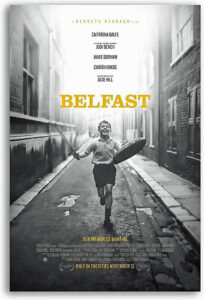 By Steve Crum
By Steve Crum
Mere minutes into the movie, you know something special, classically special, is unfolding. Its gentle grab of children cavorting in the street…the depiction of family life…the close proximity of the homes…are established.
Set in August 1969, Belfast is the story of an Irish family living in Northern Ireland whose life is told mainly through the youngest of the six, 9 year-old Buddy. Although touted as comedy-drama, the emphasis is predominantly serious drama. But identifying itself as “semi-biographical” is apt, since writer/director Kenneth Branagh based Belfast on his childhood. Branagh tells his story so vividly, so movingly.
During that time, Ireland was undergoing a tumultuous conflict within Belfast neighborhoods wherein Protestants and Catholics chose to stake their claims by segregating households block by block. It became standard that an entire section of houses was occupied by either Catholics or Protestants—never mixing within the blocks. Streets became territorial. It was akin to inner city street gang procedure. In fact, organized gangs did violently enforce the segregation. So it goes in Belfast.
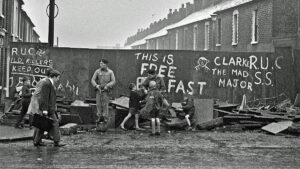 Amidst the peril of those times, we meet grade schooler Buddy and his family. (Their last names are not identified, presumably because they are closely based on Branagh’s family.) Their small house is one of lookalike dozens jammed next to each other and flanking the brick street. Their street is considered a Catholic neighborhood, and they are Protestant. They accept their neighbors, and vice versa. It is no surprise they are not popular with very nearby Protestant neighborhoods. When a Protestant-based gang decides to ramp up attacks (brick throwing, fire bombs), Buddy and his family are also targeted. As violence
Amidst the peril of those times, we meet grade schooler Buddy and his family. (Their last names are not identified, presumably because they are closely based on Branagh’s family.) Their small house is one of lookalike dozens jammed next to each other and flanking the brick street. Their street is considered a Catholic neighborhood, and they are Protestant. They accept their neighbors, and vice versa. It is no surprise they are not popular with very nearby Protestant neighborhoods. When a Protestant-based gang decides to ramp up attacks (brick throwing, fire bombs), Buddy and his family are also targeted. As violence 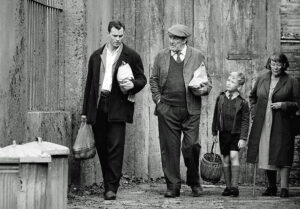 escalates, British soldiers are called in to keep the peace. That action is anything but calming, since the Brits and Irish are constantly at odds.
escalates, British soldiers are called in to keep the peace. That action is anything but calming, since the Brits and Irish are constantly at odds.
Definitely in harm’s way are Buddy (Jude Hill) and his family: “Ma,” (Caitríona Balfe), “Pa” (Jamie Dornan), older brother Will (Lewis McAskie), “Granny,” (Judi Dench), and “Pop,” the grandfather, an Oscar worthy performance by Ciarán Hinds. Really, all six are Academy Award level. Certainly they would qualify for any Best Ensemble Award.
Pa works overseas in England, and is absent for months at a time. That means Ma, Granny and Pop are left to raise the boys and keep the family safe. There are positives amidst the stress, however. Buddy and Will have fun with friends and teachers are school, and playing in the streets—whenever it is safe enough to 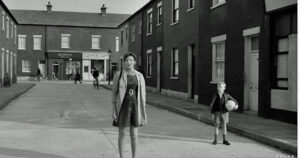 do so. They watch cartoons on the small black and white TV in the living room, and play with wooden swords. Buddy, in particular, has adventures with other children—not always sanctioned by Ma.
do so. They watch cartoons on the small black and white TV in the living room, and play with wooden swords. Buddy, in particular, has adventures with other children—not always sanctioned by Ma.
Buddy becomes very attached to Pop, and there is pause when Pop becomes ill. Pa wrestles with not being home to do his share in raising his boys, and being a good husband. When he does return home for a brief break, he is confronted by neighborhood bully/gang leader Billy Clanton (Colin Morgan), who pressures him to join the looting and burning “for the cause.” Pa rejects him, putting his family in more danger. Throughout all the tumult is a passion to love the family unit as well as one’s neighbors.
The look of the film, crediting both Branagh and cinematographer Haris Zambarloukos, is quite wonderful. The neighborhood becomes OUR neighborhood. So distinct it is, long past its 97 minute running time.
Special mention goes to Van Morrison, a Belfast native, who performs eight of his classic songs featured on the soundtrack…as well as a new one he wrote.
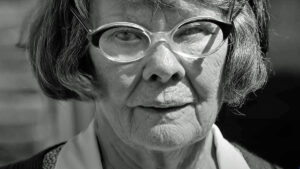 The challenges felt by Buddy and his family do evolve to a finale laced with both hope and sadness. Granny’s closing remark evokes memories of Ma Joad in The Grapes of Wrath. Like then, it works. So well.
The challenges felt by Buddy and his family do evolve to a finale laced with both hope and sadness. Granny’s closing remark evokes memories of Ma Joad in The Grapes of Wrath. Like then, it works. So well.
——-
GRADE on an A-F Scale: A
